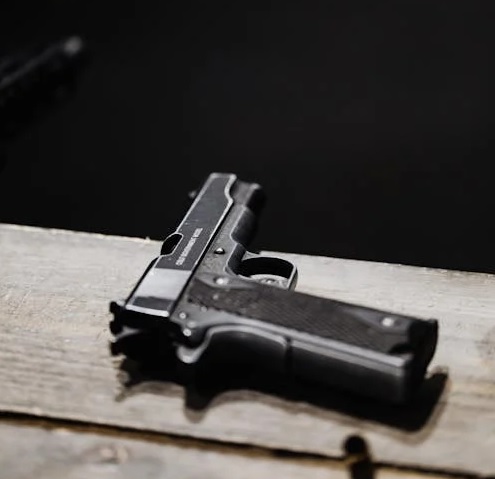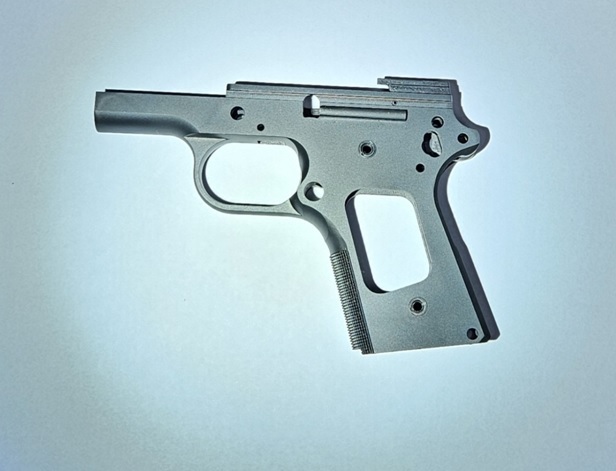Pistol Frames: Material Considerations
Sep 2nd 2024
There are three main materials from which virtually all pistol frames are made, which are steel, polymer, and aluminum.
Each of these materials has its own advantages and disadvantages. It’s hard to say one is better than the other. It’s more that each is good in its own right.
So, if you’re looking at a build and don’t know what material to choose, here are some considerations.
Steel Pistol Frames

Many pistols are made with steel frames, and in fact for a long time this was the main material from which handguns were framed. Cold 1911 pistols and many Smith & Wesson revolvers are steel-framed. Here’s what you should know about steel.
Why They’re Great
- Because of its weight, steel-framed pistols help to absorb recoil. Depending on the overall weight of the handgun and the cartridge, a steel frame can absorb recoil by as much as 10%.
- That extra weight can also be a stabilizing factor, and some find that it is easier to shoot heavier handguns more accurately in competition.
- Steel is the strongest material from which pistol frames are made, tougher than both aluminum and polymer by a long shot. Well cared for, a steel frame will outlast you.
Where They Fall Short
- The weight of steel is also a drawback, as some find it uncomfortable to carry a heavier, steel-framed pistol all day for defensive applications.
- While steel is tough, it is also the most prone to corrosion. Steel framed handguns will rust if they are not properly cared for and cleaned. Chronically humid conditions will also accelerate corrosion.
Polymer Pistol Frames
Polymer is another popular material for the construction of pistol frames, as it is affordable and lightweight. Many popular handguns like the HK VP9 and Glock pistols are made with polymer frames.
Why They’re Great
- The main advantage of polymer framed handguns is that they’re so lightweight. They can be considerably lighter than steel-framed pistols which means they are easier to carry comfortably all day.
- Polymer may not be as strong as steel, but it is effectively impervious to corrosion, which makes maintenance much more simplistic.
Where They Fall Short
- Because polymer handguns are so light, some shooters remark that they feel less stable in the grip.
- Also as a function of weight, polymer handguns will not absorb recoil well. Bigger cartridges and lighter handguns are a bad combination and will produce a lot of recoil.
- Polymer is not as strong as steel or aluminum, nor as durable overall.
Aluminum and Alloy Pistol Frames
Aluminum alloy is another material from which some pistol frames are made, which offers a unique balance of attributes that fall somewhere between steel and polymer.
Why They’re Great
- Aluminum/alloy pistol frames are lighter than steel and comparable in weight to polymer frames. This makes them lighter and easier to carry for longer with less fatigue.
- Aluminum and alloys are much more durable than polymer with little added weight.
- These pistol frames are not as corrosion-prone as steel, making them easier to care for.
Where They Fall Short
- The lightweight nature of alloy frames means that they, like polymer frames, do not absorb recoil well.
- This might not categorically be seen as a shortcoming, but alloy frames are not as immune to corrosion as polymer frames are, though they are substantially less prone than steel.
Other Pistol Frame Considerations

In addition to the material of the pistol frame you choose, you should also consider the following:
- Does the pistol frame in question have a rail integrated with it? These are generally positioned at the front of the frame, so that attachments can be mounted under the barrel. There are ways around frames that don’t have rails, but one with a rail will prove more versatile.
- Does the frame have a dust cover? If the rail has a dust cover, the frame will stay cleaner and it may also result in a pistol that is more reliable and less likely to get dirty and experience compromised reliability.
- Is the frame complete? If the pistol frame is complete, it must be serialized and per the ATF will be subject to regulations that consider it legally a firearm. Therefore, FFL transfers are required for complete pistol frames. Frames that are not complete may be referred to as frame blanks or 80% frames. These do not require an FFL transfer but are not legal in all jurisdictions, so consult all local regulations before attempting to purchase or take possession of one.
Shop Pistol Frames and Other Gun Parts Here
Looking for a new pistol frame to complete or customize a build at home? We carry a wide range of frames for popular models, along with gun parts and kits. Check them out via the previous link and if you have any questions or need help finding a specific model or gun part, get in touch with us at 610-250-3960 and we will be happy to help.

